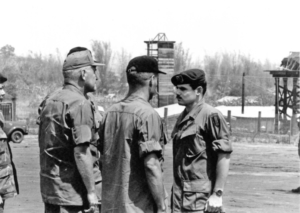From Media Scandal to Medal Of Honor?

By Debbie Gregory.
The Medal of Honor could be the final vindication in the battle to clear the name and reputation of a Green Beret soldier who served in Vietnam 47 years ago.
In September, 1970, Green Beret Gary Michael Rose was the lone medic for a company of Special Forces soldiers and indigenous Vietnamese fighters, called Montagnards, in Laos. Rose, who himself was badly injured, helped bring all the soldiers back alive. He received the Distinguished Service Cross, the nation’s second highest military honor, during a ceremony at the time in Vietnam.
But in 1998, Rose and the other men of Operation Tailwind were wrongly accused of taking part in war crimes.
Stunning claims were alleged that the Green Berets were sent to Laos to kill American defectors and that the military used sarin gas during the mission. The charges were fully discredited.
The story, which was co-written and presented by famed journalist Peter Arnett, was retracted by CNN and Time. But you can’t un-ring a bell. The retraction never erased the allegations in the view of soldiers who conducted Operation Tailwind.
The highest recognition of heroism is close for Rose. In Congress’s final version of its annual defense policy bill is legislation that clears the way for Rose to receive the Medal of Honor. While lawmakers remain deeply divided on many defense and veteran issues, there is agreement that the Green Beret medic should have his Distinguished Service Cross upgraded.
In September 1970, Rose, 15 Green Berets and their company of Montagnards were on a classified mission to take pressure off the CIA, which was running operations in the Laotian highlands, by drawing the attention of at least two North Vietnamese Army regiments in the area, according to retired Maj. John Plaster, a former Special Forces sniper and military historian who served with Rose in the Studies and Observations Group.
Rose and his unit, backed by U.S. air power, almost never stopped moving for the next four days while taking small arms, mortar and rocket fire. By the second day, about half of the Green Berets were wounded. Many more of the Montagnards had injuries. By the fourth day, all of the American had been wounded.
Plaster said, “Gary kept them moving, it was emergency medicine on the go. Think of how many people could have put up with that much stress and stay organized and cool and treat all of those people.”
Rose was wounded multiple times and had treated about 60 injured troops. The Marines had lost three Sea Stallions. But all of the soldiers had survived.
Rose’s lifesaving actions on the battlefield will become the new face of Operation Tailwind and turn a national media spotlight on the missionl.
Military Connection salutes and proudly serves veterans and service members in the Army, Navy, Air Force, Marines, Coast Guard, Guard and Reserve, and their families.

















